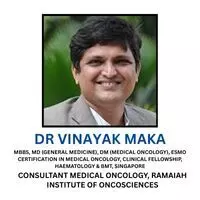New Delhi: When former U.S. President Joe Biden was recently diagnosed for prostate cancer, it reignited global conversations about this often-overlooked disease. As life expectancy in India continues to rise, so does the incidence of prostate cancer, a quiet disease that affects one in eight men worldwide.
While it remains the most common cancer among men in the West, prostate cancer is rapidly climbing the ranks in India and is now among the top ten cancers impacting Indian men.
Although Biden’s team reports a good prognosis, his diagnosis has prompted men around the world, including in India, to ask if they could be at risk. Despite its growing prevalence, awareness remains low and stigma around men’s health often prevents timely check-ups and early detection.
The prostate is a walnut-sized gland that plays a key role in reproductive function. Cancer in this gland can be life-threatening if it spreads beyond the prostate, most commonly to the bones. Risk factors include age, family history, genetics (including BRCA mutations), obesity, and smoking.

"Prostate cancer often develops quietly without symptoms, but early detection dramatically improves survival," says Dr Vivek Venkatramani, an Uro-Oncologist and Robotic Urologist. "With rising life expectancy and lifestyle-related risk factors, we’re seeing more Indian men being diagnosed, and many still catch it too late."
Prostate cancer is expected to grow rapidly in India over the next two decades. Public figures like Joe Biden, Robert De Niro, and Ben Stiller have all faced prostate cancer, helping break the stigma and raise awareness globally.
The disease is diagnosed through PSA blood tests, MRI scans, and targeted prostate biopsies. While many cases are treatable, especially when caught early, late-stage cancers often require long-term hormone or targeted therapy to manage symptoms.
"Minimally invasive procedures like robotic prostatectomy are revolutionizing outcomes, with faster recovery and excellent cure rates in early-stage cases," adds Dr. Venkat. "But the key is catching it early."
Dr Venkat urges men to break the stigma around health check-ups and be proactive, because when detected early, prostate cancer is not just treatable, it's curable.
What Causes Prostate Cancer?

Dr Shreyas N, Consultant Urologist at Fortis Hospital, Bangalore says, "The exact cause of prostate cancer remains unknown, but certain risk factors increase the likelihood of developing it. Age is a significant factor, with most cases diagnosed in men over 65.
Family history and genetics, particularly BRCA1 or BRCA2 mutations, also play a crucial role. Ethnicity matters as well, African American men have a higher incidence. Lifestyle factors such as obesity and diets high in red meat may contribute, along with exposure to environmental toxins."
He emphasizes the importance of awareness and screening to catch the disease early.
Who is at Risk and When Should Men Get Screened?
The risk of prostate cancer increases with age, especially for men over 50. Those with a family history or genetic mutations such as BRCA1/BRCA2 should consider screening earlier, around age 45.

Dr Vinayak Maka, Consultant at Ramaiah Institute of Oncosciences, explains, "The risk of prostate cancer increases with age and is especially prevalent in men over the age of 50. Men with a family history of prostate cancer, or men with genetic mutations (ex. BRCA1/BRCA2) should seriously consider screening at a younger age, approximately 45. In general, screening for prostate cancer for men at average risk will usually begin at the age of 50. The prostate specific antigen (PSA) test as well as the digital rectal exam (DRE) are common methods of screening, but they are not absolute indicators of prostate cancer. For men who are between 55-69 years of age, they should reference their physician regarding screening, considering their overall health and of life expectancy. After 70 years of age or if overall health changes, screening may not continue unless overall health permits. It is very important to have a discussion with your physician surrounding your own individual risks to determine the most applicable screening plan."
What are the Symptoms of Prostate Cancer?
Early prostate cancer often develops silently without symptoms. When symptoms do appear, they may include frequent urination, difficulty starting or stopping urine flow, weak stream, blood in urine or semen, and pain in the back or pelvis, typically indicating advanced disease.
"Because the disease is often symptomless in early stages, routine screening is vital," stresses Dr. Vivek Venkatramani.
How is Prostate Cancer Treated and Is it Curable?
Treatment depends on the stage and aggressiveness of the cancer. Early-stage prostate cancer may be managed with active surveillance, surgery, or radiation. Advanced stages often require hormone therapy, chemotherapy, or immunotherapy.
Dr Vinayak Maka shares, "Prostate cancer treatment depends on the stage, Gleason score, and patient's overall health. Early-stage cancer may be treated with active surveillance, surgery (prostatectomy), or radiation therapy. Advanced cases may require hormone therapy, chemotherapy, or immunotherapy. Treatment goals are to control the cancer, manage symptoms, and maintain quality of life. Prostate cancer is often curable if detected early, with a high five-year survival rate. Advances in medical technology and treatment options have improved outcomes, making it essential to work with a healthcare team to determine the best course of treatment for each individual case. Robotic radical prostatectomy helps to achieve a greater cure with maintaining urinary continence and sexual function."
Can Prostate Cancer Be Prevented? What Lifestyle Changes Help?
While prostate cancer cannot be entirely prevented, healthy lifestyle choices can reduce risk. A balanced diet rich in fruits, vegetables, and whole grains, regular exercise (at least 150 minutes of moderate activity weekly), quitting smoking, limiting alcohol, managing stress, and ensuring quality sleep all contribute to lowering risk.
Dr Vinayak Maka advises, "Prostate cancer cannot be prevented completely, but healthy lifestyle changes can reduce risk and promote overall health. A balanced diet, which includes fruits and vegetables, whole grains, and low in saturated fat, may reduce the risk. Regular physical activity also supports weight control and overall health; You should target for at least 150 minutes of moderate-intensive exercise each week. Quit smoking and limit alcohol consumption. Manage stress using relaxation techniques. Ensure quality sleeping (7–8 hours per night). For early detection, schedule regular appointments with your physician and routine health screening. Using this lifestyle, we can help decrease the risk of cancer and improve your overall quality of life."
Why does Early Detection Matter?
The message from experts is clear: prostate cancer is often treatable and curable if detected early. With rising cases in India and globally, men must break the stigma around prostate health and seek regular screenings.
Dr Vivek Venkatramani concludes, "It’s time for men to be proactive about their health, because when caught early, prostate cancer is not just treatable, it’s curable."



